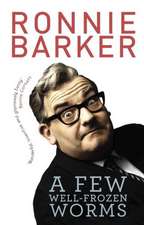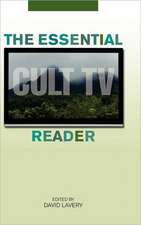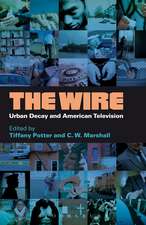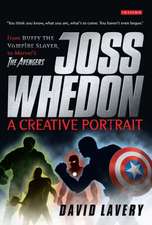Seinfeld, Master of Its Domain: Revisiting Television's Greatest Sitcom
Editat de David Lavery, Sara Lewis Dunneen Limba Engleză Paperback – 31 mar 2006
Preț: 193.18 lei
Nou
Puncte Express: 290
Preț estimativ în valută:
36.97€ • 40.14$ • 31.05£
36.97€ • 40.14$ • 31.05£
Carte tipărită la comandă
Livrare economică 23 aprilie-07 mai
Preluare comenzi: 021 569.72.76
Specificații
ISBN-13: 9780826418036
ISBN-10: 0826418031
Pagini: 290
Dimensiuni: 150 x 227 x 21 mm
Greutate: 0.43 kg
Editura: Bloomsbury Publishing
Colecția Continuum
Locul publicării:New York, United States
ISBN-10: 0826418031
Pagini: 290
Dimensiuni: 150 x 227 x 21 mm
Greutate: 0.43 kg
Editura: Bloomsbury Publishing
Colecția Continuum
Locul publicării:New York, United States
Caracteristici
A wide-ranging and entertaining collection of essays and articles about Seinfeld.
Cuprins
David Lavery and Sara Lewis Dunne (Middle Tennessee State University), Preface. "Part of Popular Culture": The Legacy of Seinfeld Section 1. "Giddy-Up!": IntroductionsAlbert Auster (Fordham University), Much Ado About Nothing: Some Final Thoughts on Seinfeld David Marc (Syracuse University), Seinfeld: A Show (Almost) About NothingBill Wyman, SeinfeldReflections on SeinfeldSection 2. "Maybe the dingoes ate your baby": Genre, Humor, IntertextualityMichael Dunne (Middle Tennessee State University), Seinfeld as Intertextual Comedy Barbara Ching (University of Memphis), They Laughed Unhappily Ever After: Seinfeld, Situation Comedy, and the Encounter with NothingnessDennis Hall (University of Louisville), Jane Austen, Meet Jerry SeinfeldAmy McWilliams (Texas A & M), Genre Expectation and Narrative Innovation in SeinfeldSection 3. "If I like their race, how can that be racist?": Gender, Generations, and EthnicityJoanna L. Di Mattia (Monash University), Male Anxiety and the Buddy System in Seinfeld Matthew Bond, "Are they having babies just so people will visit them?": Parents and Children on SeinfeldJon Stratton (Curtin University of Technology), Seinfeld is a Jewish Sitcom, Isn't It: Ethnicity and Assimilation on 1990s American TelevisionSection 4. "It is so sad, all your knowledge of high culture comes from Bugs Bunny cartoons": Cultural, Pop Cultural, and Media MattersGeoffrey O'Brien, The Republic of Seinfeld Sara Lewis Dunne (Middle Tennessee State University), Seinfood: Purity, Danger, and Food Codes on SeinfeldEleanor Hersey (Fresno Pacific University), "It'll Always Be Burma to Me": J. Peterman on Seinfeld Elke van Cassel (Radboud University Nijmegen), Getting the Joke: Seinfeld from a European PerspectiveMichael M. Epstein (Southwestern University School of Law), Mark C. Rogers (Walsh University), and Jimmie L. Reeves (Texas Tech University), From Must-See-TV to Branded Counter Programming: Seinfeld and SyndicationSection 5. AfterwordDavid Lavery, Middle Tennessee State University, with Marc Leverette, Colorado State University, Re-Reading Seinfeld after Curb Your EnthusiasmSection 6. "Get Out!": Back PagesBetty Lee, Seinfeld Lexicon Seinfeld Episode and Situation Guide (by David Lavery)Seinfeld Intertexts and AllusionsContributors Bibliography Index
Recenzii
"Seinfeld, Master of Its Domain is all about interpretation. In this high-powered volume, academics consider the beloved sitcom in various disciplinary contexts. Even more vital is the collection's one attempt to stop outside the comedic universe of 'Seinfeld' and consider it as a television production, "From Must-See-TV to Branded Counterprogramming: 'Seinfeld' and Syndication," by Michael M. Epistein, Mark C. Rogers and Jimmie L. Reeves. This essay, richly researched and packed with broadcast history, details how the show's syndication deal works, and hot it functions in the world of corporate media."- Newsday.com, February 19, 2006
Readers familiar with academic "cultural studies" aren't likely to tingle with anticipation when our eyes fall on a scholarly article from the Centre for Women's Studies and Gender Research at Monash University in Melbourne. And the title of Joanna L. Di Mattia's essay, "Male Anxiety and the Buddy System in Seinfeld," does nothing to lighten our mood. We expect to be rewarded, at best, with the warm feeling of virtue that follows the performance of a duty requiring heavy lifting.But it turns out that Jerry, George, Elaine and Kramer, whose program ceased production in 1998 but still circles the planet in endless reruns, provide as much fun for academics as for the rest of us. With their lives and their world now sealed off in a 20th-century time capsule, they have become appropriate subjects for cheeky theorizing in the universities.Di Mattia's essay, for instance, explores a fascinating question with persuasive force. While not for a moment suggesting that Jerry and George be compared to cowboys on Brokeback Mountain, she nevertheless deftly makes the point that as TV characters they are the perfect married couple.Her essay appears in Seinfeld, Master of Its Domain: Revisiting Television's Greatest Sitcom (Continuum), edited by David Lavery and Sara Lewis Dunne of Middle Tennessee State University. This isn't the first attempt to provide fodder for Seinfeld studies -- earlier works include William Irwin's 1999 collection, Seinfeld and Philosophy: A Book about Everything and Nothing, and Shows About Nothing: Nihilism in Popular Culture from The Exorcist to Seinfeld, written by Thomas S. Hibbs in 2000.But this latest book notably differs in tone from standard university products. Appreciation and enjoyment, combined with wonder at the cleverness of the program's writers, set the tone. The platoon of scholars writing the essays understand Seinfeld as brilliant popular art, not merely a specimen demanding intellectual dissection. This means we can admire their insights without giving up our love for the best television farce we'll ever see. -The National Post, Toronto
"Noted television and pop culture academic and critic Lavery-who haspreviously written and edited scholarly texts on such television supernovasas Twin Peaks, The X-Files, and Buffy the Vampire Slayer-has whipped up afrothy egg cream of an essay collection on Seinfeld for eggheads. Sixteenessays (some new, some previously published and revised) are divided amongfour topical sections with an afterword and supplementary material featuringa glossary of Seinfeld terms and expressions and an episode guide. Theessays in Part 1 generally give an overview of the show before segueing intoPart 2's exploration of "genre, humor, and intertexuality." Part 3 treatsissues of "gender, generations, and ethnicity," while Part 4 concludes withessays on "cultural, pop cultural, and media matters." As Lavery notes inhis preface, despite Seinfeld's iconic stature-half of us loved it, and theother half loved to hate it-only one serious monograph has been published.This anthology featuring the likes of Geoffrey O'Brien and Eleanor Herseywill best serve academic media and pop culture collections and seriousreaders who like their TV eggs hard-boiled. The recent release of the showon DVD should increase interest".- Library Journal, February 2006
Readers familiar with academic "cultural studies" aren't likely to tingle with anticipation when our eyes fall on a scholarly article from the Centre for Women's Studies and Gender Research at Monash University in Melbourne. And the title of Joanna L. Di Mattia's essay, "Male Anxiety and the Buddy System in Seinfeld," does nothing to lighten our mood. We expect to be rewarded, at best, with the warm feeling of virtue that follows the performance of a duty requiring heavy lifting.But it turns out that Jerry, George, Elaine and Kramer, whose program ceased production in 1998 but still circles the planet in endless reruns, provide as much fun for academics as for the rest of us. With their lives and their world now sealed off in a 20th-century time capsule, they have become appropriate subjects for cheeky theorizing in the universities.Di Mattia's essay, for instance, explores a fascinating question with persuasive force. While not for a moment suggesting that Jerry and George be compared to cowboys on Brokeback Mountain, she nevertheless deftly makes the point that as TV characters they are the perfect married couple.Her essay appears in Seinfeld, Master of Its Domain: Revisiting Television's Greatest Sitcom (Continuum), edited by David Lavery and Sara Lewis Dunne of Middle Tennessee State University. This isn't the first attempt to provide fodder for Seinfeld studies -- earlier works include William Irwin's 1999 collection, Seinfeld and Philosophy: A Book about Everything and Nothing, and Shows About Nothing: Nihilism in Popular Culture from The Exorcist to Seinfeld, written by Thomas S. Hibbs in 2000.But this latest book notably differs in tone from standard university products. Appreciation and enjoyment, combined with wonder at the cleverness of the program's writers, set the tone. The platoon of scholars writing the essays understand Seinfeld as brilliant popular art, not merely a specimen demanding intellectual dissection. This means we can admire their insights without giving up our love for the best television farce we'll ever see. -The National Post, Toronto
"Noted television and pop culture academic and critic Lavery-who haspreviously written and edited scholarly texts on such television supernovasas Twin Peaks, The X-Files, and Buffy the Vampire Slayer-has whipped up afrothy egg cream of an essay collection on Seinfeld for eggheads. Sixteenessays (some new, some previously published and revised) are divided amongfour topical sections with an afterword and supplementary material featuringa glossary of Seinfeld terms and expressions and an episode guide. Theessays in Part 1 generally give an overview of the show before segueing intoPart 2's exploration of "genre, humor, and intertexuality." Part 3 treatsissues of "gender, generations, and ethnicity," while Part 4 concludes withessays on "cultural, pop cultural, and media matters." As Lavery notes inhis preface, despite Seinfeld's iconic stature-half of us loved it, and theother half loved to hate it-only one serious monograph has been published.This anthology featuring the likes of Geoffrey O'Brien and Eleanor Herseywill best serve academic media and pop culture collections and seriousreaders who like their TV eggs hard-boiled. The recent release of the showon DVD should increase interest".- Library Journal, February 2006










